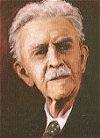INTRODUCTION
Alfred Hill (not to be confused with
another worthwhile romantic, the American, Edward Burlinghame Hill) was born
in Melbourne in 1870 and came from a musical family. From 1887-1891 he studied
in Leipzig with Hans Sitt, Gustav Schreck and Hans Paul. He played under
the baton of Carl Reinecke at the Gewandhaus where he was also an orchestral
player at concerts conducted by Brahms and Tchaikovsky.
In 1892 he went to New Zealand to become conductor of the Wellington Choral
Society. There he wrote various Maori-themed works including the Maori Symphony
(No. 1). From 1896-1902 he was based in Sydney but went to back to NZ in
1906 and 1907 to direct his Maori opera Tapu. From this point forwards he
seems to have been predominantly a voice in Australian musical culture although
still a presence and visitor to New Zealand. He was extremely active in the
production of operas (perhaps we will hear them sometime) and his Waiata
Poi sung by Australian singer Peter Dawson became a world-wide hit on 78.
His complement of works includes 17 string quartets (mostly dating from the
1930s) and thirteen symphonies (arrangements, largely of the quartets). The
symphonies were completed during the period 1941-1960.
It might be helpful to provide a chronology of these to help place them:-
Symphonies date basis
No. 1 Maori 1896-1900 original work
No. 2 ? ?
No. 3 Australia 1951 String Quartet No. 14 (1937)
No. 4 Pursuit of Happiness 1955 ?
No. 5 Carnival 1955 String Quartet (1912)
No. 6 Celtic 1956 String Quartet (1938)
No. 7 1956 String Quartet No. 10 (1935)
No. 8 1957 ?
No. 9 Melodious 1957 ?
No. 10 Short 1958 String Quartet (1938)
No. 11 1958 ?
No. 12 1959? ?
No. 13 1959? ?
Perhaps the New Grove (due for publication in 2001?) will redress matters
however if you go to the 1954 Grove you will find not a single mention of
any Hill symphony. The entry is woefully inadequate.
Hill's music seems to me to fall into two stylistic camps. First, in the
symphonies (most of which are arrangements of his own string quartets) the
voices of Schumann, Mendelssohn, Goetz and Bruch are predominant. This can
be unnerving given the dates of composition but should not hinder enjoyment.
After all what does it matter WHEN a piece was written. The importance of
originality (read new-ness) of music is rather over-stated. What matters
is what is said rather than the medium for its saying. Would the pleasure
given by one of these symphonies played without announcement (The Innocent
Ear) diminish when we learn, after hearing it, that it was written 60 or
more years after the language used was the common currency. Secondly, in
his smaller tone poems, he leans into an impressionistic vein. Just occasionally
the two styles collide and it is at moments like this that parallels with
the Dane Rued Langgaard - another composer much given to anachronistic style
- leaps to mind.
The notes for this Marco Polo series are good though some resort to technicality.
The sound quality is fine even in the early DDD tapes of Symphonies 4 and
6.
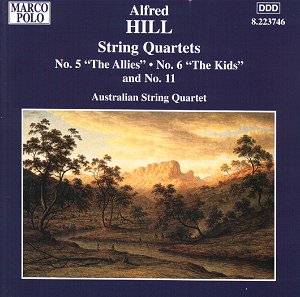
Hill's 17 quartets cover the years 1912-1938. Hill learnt his chamber technique
as a member of the Austral Quartet (floreat 1911). The quartets are on this
evidence and the evidence of another (No. 2 The Maori - yes another
one with that title) I have on tape, works of Mendelssohnian charm and
Schumann-lit romance. The evidently loving performances are warmly crafted
and anyone who is keen on the Dvorák quartets must hear this disc.
The third movements of Numbers 5 and 6 are of gem like suspense - like the
parallel movement in the Schubert Quintet. Only in No. 11 (in this collection)
does a Delian or Grieg-like sun shine lambently through the writing.

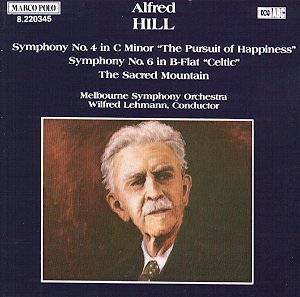
The conductor, Wilfred Lehmann, was born in Melbourne and secured his career
initially as a concert-master. In this capacity he spent ten years with the
Tokyo PO and the Tokyo Metropolitan SO. He conducts the Australian orchestras
and tours widely. On the showing of the three Marco Polo CDs he is a committed
advocate of Hill's music.
Despite the back cover of the CD each movement of the symphonies is separately
banded. No. 4 is dedicated to the Austrian émigré conductor
Henry Krips (who recorded Hill's Australia symphony in the 1950s). This is
a work of sunny aspect dotted with quotations from William Morris and Bernard
Russell. The first movement is romantically rounded and contented with the
air of early Delius about it. The tense ghostly strings at 3.20 are worth
noting. The second movement reminded me of the lighter Elgar (Wand of Youth)
and a little of Tchaikovsky. The finale darts and sprints as in the Mendelssohn
Octet or Midsummer Night's Dream, music. There is a chipper oboe song which
may remind you of a similar tune from Dvorák's New World.
The Celtic Symphony is about as Gaelic as Stanford's Irish or Amy Beach's
Gaelic - i.e. not very. There is a slow introduction, countryside dawn chorus
(Beethoven Pastoral) and some Irish jiggery. The second movement is low key
and uses an Irish folk song. The third movement reels back into an Irish
jig and the finale takes me back to the Sullivan Irish Symphony with a
Mendelssohnian wink and a nod.
Despite the Hovhaness-like title Sacred Mountain is still somewhat old-fashioned
but rather more 'modern' than the symphonies. A filmic tendency can be discerned
in music of open romance and Korngoldian glamour. There is even a lush violin
solo.

ALFRED HILL Symphony No. 3 Australia
(1951) [27.00] Symphony No. 7 (1956) [20.30] The Moon's
Golden Horn [5.25] The Lost Hunter
[13.16]  Queensland SO/Wilfred
Lehmann
Queensland SO/Wilfred
Lehmann rec Brisbane 1-12 Feb 1993 MARCO POLO 8.223537 [67.09]
rec Brisbane 1-12 Feb 1993 MARCO POLO 8.223537 [67.09]
AMAZON
UK offered at £4.99
|

|
Save around 22% with
Crotchet
Amazon
|
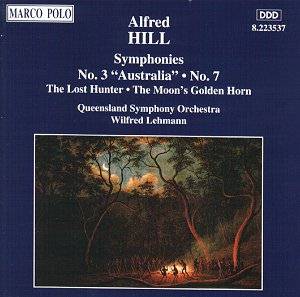
This is the most generous of the four discs and the CD that you should try
first.
The Australia Symphony was recorded by Australian EMI on OALP 7524 with the
Sydney SO conducted by Henry Krips. This was a tape of a concert performance
given on 16 December 1959 on Hill's 89th birthday. Hill was to die the following
year. The symphony is in four movements the first of which takes Schumann
(Symphonies 1 and 2) and Tchaikovsky (Symphony 5) as models in music of elegant
and romantic ease. The adagio is of an eerie beauty while the third movement
(Arnhem Land - Hill's wife Mirrie wrote a whole symphony with this title
and this too was performed by Henry Krips and the Sydney SO) is alternately
stirring and dreamily wandering in the manner of Tchaikovsky 4. The finale
has a silvery lunar romance and bubbling vitality with fine work for the
strings.
The Seventh Symphony's first movement is glowingly romantic and of a long-lying
thematic richness. Hill was clearly a most fastidious orchestrator as there
is never any blur; instead we are treated to music of Elysian tenderness.
The second movement is redolent of Grieg (The Last Spring). The bustling
presto third movement is Brahmsian and playful. The fourth movement chuckles
with Brahmsian bustle and even a most unusual hint of Franz Schmidt (Hussar
Song).
The Lost Hunter is light on the aural palate and its opening bars resound
to ppp fanfares echoing around the glistening ramparts of morning. Here he
seems to have cast off Schumann and instead resorted to a languid nature
mysticism not so far a remove from Bax's Spring Fire. Karelia's alla marcia
is suggested by the lithe music at 5.00 and Richard Strauss in the jollity
of the final five minutes. The Moon's Golden Horn might well be described
as Leipzig impressionism: somewhat of a static idyll of quietly simmering
ecstasy.

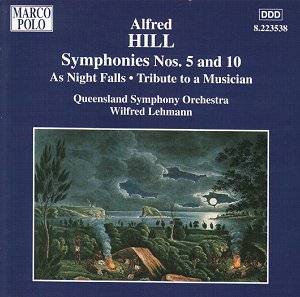
The brevity of his works helps with the general impression of Hill's music
being of perfectly judged balance.
Carnival runs the gamut from Italianate raciness and Verdian elan through
Venetian crowds and midnight fireworks, to the grave pavane of the third
movement and the Massenet-like snap (think of the music for El Cid) of the
finale. No. 10 gives us a slow Mendelssohnian introduction, a Bruchian adagio
of warm fragrant romance and a final allegretto that is a distant relation
of the prestos from the Italian or Scotch symphonies.
The four short works are less old-fashioned (if that is important). Night
Falls is of gentle demeanour sharing atmosphere with Dvorák's Serenade
for Strings. Reverie has clouds floating contentedly through a moon-illumined
sky. Regrets is a romantic flood teetering on the edge of Khachaturyan's
Phrygia Adagio from Spartacus while Tribute to a Musician has Brahmsian warmth,
tranquillity and no violence whatsoever. A complete 79 minutes of these
orchestral miniatures by Hill (there are a lot more!) would make a very
acceptable CD.

SUMMARY
Works written in an established and non-revolutionary manner. High craftsmanship.
Singable tunes. Good performances. Good atmosphere. Light on dark drama.
Will be enjoyed by admirers of Schumann, Mendelssohn, Dvorák and Delius.
SIGNPOSTS
Start with Symphonies 3 and 7 8.223537 and then move to Symphonies 4/6 and
then 5/10 and finally the string quartets.
PROSPECTS?
Keep your eyes peeled for new issues in the series. The Maori Symphony and
No. 2 Joy of Life are likely to be worth hearing.
Reviewer
Rob Barnett
OVERALL -


